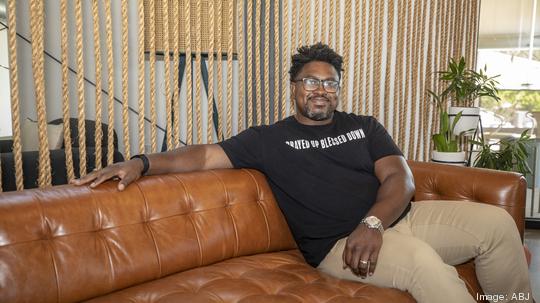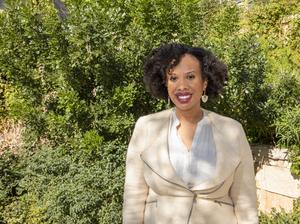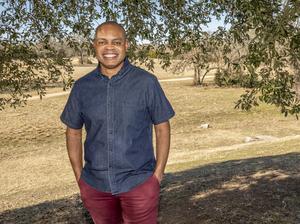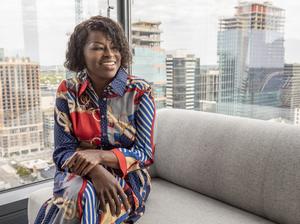
Harold Hughes, a tech startup founder and a rising star in Austin's entrepreneurial ecosystem, makes sounding smart look easy these days.
But that wasn't always the case.
The New York-born youngster moved to Jamaica for kindergarten and when he returned to the U.S. in South Carolina, classmates couldn't understand his thick accent. They picked on him and called him dumb. Hughes knew he wasn't dumb, and his mom reassured him. But Hughes wasn't going to let it rest. He took action.
"So I remember, you know, forging her signature to get a speech pathologist in elementary school, where instead of going to recess, I was going to a friend's mom for work on speech pathology," he said. "And I think that's kind of shaped how I try to communicate now. I don't even care to change people's minds. I just want to make sure that I'm understood."
He's a fast learner who kept on expanding his horizons, from early forays selling Airheads candy at school to earning an MBA and, more recently, founding a startup called Bandwagon that helps sports and entertainment venues learn more about attendees.
While Bandwagon's team is mostly in Greenville, South Carolina, Hughes is right here in Austin helping build the local startup ecosystem as board member at Beam, an Austin nonprofit that supports women founders. And he has a few other interesting skills that involve tasty eats and bourbon.
What was your first job like? I definitely had to try and contribute early to my household. As a kid, I loved soccer. I played soccer, and my dad coached my team. And when I wasn't playing, I was refereeing. I remember they would pay us cash. That Saturday, you knew how much you were going to make based on the number of games. So that was like the first time I made money. But then my first "job" job was probably — and you know, everyone should have some experience on the serving side — I worked at Schlotzsky's Deli. I worked at Rack Room Shoes. And I worked at Garrett's Grill & Grog, which is a sports bar where I was a server.
What's your "coming to Austin" story? In Q4 2017, my company was running out of money. I told my wife [and son], "I'm not sure if Greenville is the right place for us anymore. And I'm not close to many investors. There aren't many customers here. Austin is the live music capital of the world. I think I need a change of pace."
So there's this accelerator there called Techstars. I applied to get in. I was in the final round and didn't get in. But I did get in the Capital Factory. And I said, "Hey, I can go to Austin. It's a six-month stint. If it works, it works. If it doesn't, it doesn't." I sold our townhouse, moved down here to live with a friend in Round Rock, and really just said "OK, well, I'm gonna' just try to figure out Capital Factory and figure out Austin, learn customers, find investors," and I gave myself six months. I figured Austin was a great place with live events. It's close to Dallas, Houston, San Antonio, for the fact that we try to target live event customers and sports teams. And it was the middle of the country, which allowed me to get to San Francisco a lot easier.
So I did that for six months and things went really, really well. I went back home that summer and told my wife, "Hey, I think Austin's going to be good for us. We should go there." And so we buttoned up some things and decided to move to Austin summer 2019.
Where do you think Austin's startup scene is at in terms of inclusion and equity? And how can we improve? Granted, I've only been here since 2018. But over those three years, there's not been much change of Black fund managers, women fund managers, Latinx, LGBTQ ... Being able to see bigger names come up faster is something that I think would be important. And, on top of that, I think we're going to be able to pull people in. Even with everyone doing the whole mass exodus from Silicon Valley thing, we do want those people to come here and lend their talents and resources. But there's a lot of people who have been here in Austin that are not getting the attention they should be getting. And so what we're missing out on is the people who've been quietly building and may not be seeking out the limelight in that same kind of way. How do we help make sure that they're getting amplified?
I think that Austin is doing good, and it can be doing better if we are intentional about amplifying the work of our community members who have been here and may not be the ones who'd be the first to raise their hands, having more people champion and advocate for them.
In terms of Austin's growth, keep it coming or is enough enough? The growth is great. I mean, I can't afford to buy a house here, which is fine. I'm renting a nice townhouse. But I think that it's great to see distribution of information and access. I think that we're not at a period of, like, uncontrolled growth. I do think that I want to see us grow in different ways. I don't want us to continue to grow in the same traditional ways, where we're building the same types of companies. I want to make sure that we're seeing a change in the funding landscape, we're seeing a change in the access to education landscape. I want to see that we've got infrastructure to support our homeless neighbors and making sure that we're bringing along people as these new jobs are coming in and are higher net worth and we're doing the things we need to on rescaling as well.
Let's talk a bit about the audio app Clubhouse. You've become pretty well known there. Last I saw you had 12,000 followers or something like that. How did you get into it and how has it evolved for you? Yeah, I'm up there, almost 15,000. So it's been growing pretty quick.
I'm on Twitter a lot. It's my favorite and preferred social media platform. And people everywhere were just talking about it ... Clubhouse this and clubhouse that. Chris Lyons [managing partner at Andreessen Horowitz] was talking about how great of an opportunity it was for Black people to have access to this network, early on, pre-launch, while still in beta. And so he asked me if I was open to checking it out. So I signed up and got on in late May of 2020. And then from there, I've really just enjoyed creating the conversations, and you can navigate it while working and have a conversation on in the background while working on an Excel spreadsheet.
So for me, I think it was just a great opportunity to not only build relationships with people you probably would have never met. But the nuance of voice, you know, is you're not having things being misconstrued because you're trying to explain a very complex topic, and in 280 characters. So I've enjoyed creating conversations and community on there.
What do you think novices need to know about how to get the most out of Clubhouse? Being intentional with your time is probably the most important thing. I think a lot of times folks go on and try to be celebrity adjacent, and they want to get into a room that a celebrity is speaking about or they want to have a bunch of followers. I think the biggest thing for me is navigating what conversations actually drive value for me. So throughout the week, I'm participating in pitch practice every Tuesday night where we are helping founders tighten up their pitch. On Fridays, we do "help fest" where it's almost like therapy, but more so about working on a business problem.
I think the biggest thing is to think through what rooms you are spending time in, and if something isn't serving you, making you better or smarter or entertaining you, do not go in.
I think it's said in your profile that you're a bourbon drinker — is that right? Any favorites? I'm a huge fan of Bulleit as my standard drink. But Uncle Nearest is a solid one, which is a Black-owned bourbon whiskey company, which is awesome. And then I recently got this one that is owned by two women in D.C., where they partnered with an artist to draw Vice President Kamala Harris' face on the bottle, and it is insane. So I made sure to buy a couple bottles, and I was like, "Oh, I'll just keep this and never open it and just have it as like something decorative." But then I heard it was good. And I said "Well, I'm going to try it" and it's delicious, and it's called Madam. It is a bourbon, and I don't know how many they're doing so I made sure to grab a bottle that I can drink and a bottle that I can keep sealed forever. Maybe one day I can get like an autograph or something like that.
You're also a bit of a grill master. What's your favorite thing to make? So, I love making ribs. My wife loves my ribs. She doesn't eat brisket as much, even though I love brisket. When you're making a 14-pound brisket, you need more people to eat it. Last year when everything shut down for Covid, we invested in a Big Green Egg.
Even though I thought I was a good cook, like two years ago, it's like night and day how much better of a cook I've been in the last like nine months than I was the previous like two years. You can see the seasoning is different, the plating is different.
I make a really great set of smoked St. Louis ribs on the Big Green Egg. I use Sienna Sauce, which is a Black-owned, woman-owned, family-owned company in Houston that I actually got to invest in via Republic on their crowdfunding campaign.
Titles: Founder and CEO, Bandwagon; board member, Beam
Age: 35
Hometown: Columbia, South Carolina
Family: Wife and 4-year-old son
Education: Bachelor's degree in economics and political science and MBA in supply chain and information systems, Clemson University
Contact: harold@bandwagonfanclub.com







